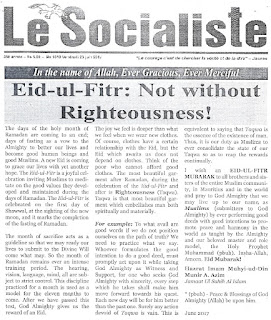During the last days of Ramadhan- just ahead of the
Eid-ul-Fitr 2017-
Khalifatullah Hadhrat Munir Ahmad Azim Saheb (atba) of Mauritius issued a special
message in the form of a Press Article, greeting the people of Mauritius,
especially its whole Muslim community. The spiritual message was carried by newspapers
such as Le Socialiste and the Mauritius Times
- 23 June 2017.
The Press Article is a gentle reminder of the larger
meaning of ‘fasting’ and ‘feasting’ in Islam. The spirit of restraint and
sobriety occasioned by the holy month of Ramadhan needs to be sustained by the believers beyond
Ramadhan. Taqwah, the invisible raiment of righteousness needs to be adorned by
the believers in all that we do all through our lives so that our deeds meet
with God’s approval and we become agents of peace, harmony and social
understanding and thereby, live up to our identity as ‘Muslims’- “submitters to God Almighty”, Insha-Allah, Aameen.
 Read
the Article Below:
Read
the Article Below:In the name of Allah, Ever Gracious, Ever Merciful
Eid-Ul-Fitr: Not Without Righteousness!
The days of the holy month of Ramadan are coming to an end; days of fasting as a vow to the Almighty to better our lives and become good human beings and good Muslims. A new Eid is coming to grace our lives with yet another hope. The Eid-ul-Fitr is a joyful celebration inviting Muslims to meditate on the good values they developed and maintained during the days of Ramadan. The Eid-ul-Fitr is celebrated on the first day of Shawwal, at the sighting of the new moon, and it marks the completion of the fasting of Ramadan.








